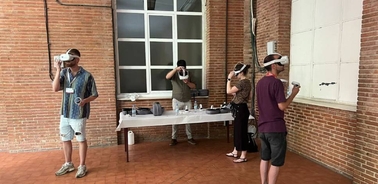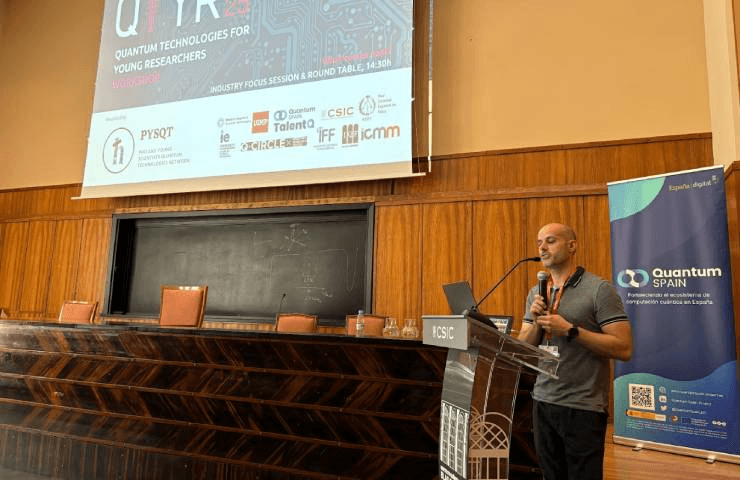QTYR25: Where Young Quantum Researchers Shape the Future of Technology

Quantum Technologies workshop connects Spain's quantum community and showcases IE Sci-Tech’s VR Innovation.
Quantum technologies are expected to redefine what’s computationally possible, enabling unbreakable communication, ultra-precise sensors, and solving problems that are intractable for today’s best supercomputers. Building the ecosystem now means shaping the scientific, technological, and ethical foundations of this next revolution.
QTYR25, the Quantum Technologies for Young Researchers workshop, sponsored in part by IE School of Science & Technology, brought together emerging scientists for four days of research presentations and industry talks in Madrid on July 8. The gathering gave postdocs, PhD, and Master's students a chance to present their work in quantum computing, quantum information, quantum optics, quantum communication, and quantum sensing.
Experiencing Quantum in Action
One of the ways participants got to engage with quantum concepts directly was through the IE Quantum Hack VR Experience—a gamified, immersive demonstration of how quantum computing can be taught through collaborative play.
"Quantum computing is expected to be one of the most disruptive technologies of the century and even of the history of mankind," the VR scenario opens. Participants played through a cooperative challenge, learning to navigate concepts like qubits, entanglement, and quantum coherence - while trying to stop a quantum hacker from breaking the system.
The IE Quantum Hack VR Experience was made possible thanks to the initiative of the School of Sci-Tech’s Vice Dean Rafif Srour Daher. The tool itself was developed by physicist and IE faculty Irene Alda, and renowned mathematician and science communicator Eduardo Sáenz de Cabezón. Attendees had the opportunity to experience the VR demo live at the event, many for the first time.
Industry Perspectives on Quantum Careers
The workshop’s career session offered a grounded take on the quantum job market. Industry professionals discussed the reality of entering this field, highlighting that career paths are rarely linear and often depend as much on adaptability as on technical depth.
"We encouraged them to explore things they are passionate about, because they will learn skills that are transferable to industry," noted Irene Alda, who also participated in the scientific program. "This focus on flexibility and cross-disciplinary skills is becoming more and more important as quantum graduates transition from academia to applied tech roles."
The scientific agenda included over 30 contributed talks spanning everything from quantum circuits with multiterminal Josephson-Andreev junctions to measurement-device-independent quantum random number generation. Two poster sessions added further room for discussion and collaboration.
Industry participants such as ARQUIMEA Research Center and Navantia helped bridge the academic and applied research worlds, encouraging dialogue between researchers and those building quantum technologies in the field.
The event also marked a milestone for many students, who gained their first conference experience, presenting research and connecting with Spain’s growing quantum network.
Workshops like QTYR25 help foster interdisciplinary perspectives and connect quantum research to adjacent fields like quantum gravity or computational ethics. By bringing together young researchers, established academics, and industry professionals, events like this create the connections and collaborations that could drive the next wave of quantum innovation.
QTYR25 was organized by the PhD and Young Scientists in Quantum Technologies Network (PYSQT) and held at the Institute of Physical Chemistry Blas Cabrera, CSIC, Madrid.
